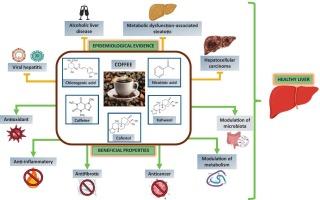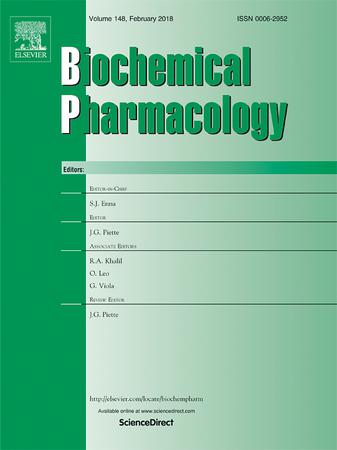Coffee for the liver: a mechanistic approach
IF 5.6
2区 医学
Q1 PHARMACOLOGY & PHARMACY
引用次数: 0
Abstract
The liver, which is essential for metabolism and detoxification, is vulnerable to various damaging factors, including viral infections, excessive alcohol consumption, and a diet high in fat and sugar. Coffee, one of the most widely consumed beverages worldwide, is valued not only for its flavor and aroma but also for its potential health benefits. In this context, the protective effects of its consumption against liver diseases have been extensively studied. Epidemiological, experimental, and clinical evidence suggests that regular coffee consumption reduces the risk of liver disease and slows its progression to fibrosis, cirrhosis, and hepatocellular carcinoma. These benefits are attributed to its complex composition comprising various bioactive compounds such as caffeine, polyphenols, and diterpenes, which have anti-inflammatory, antioxidant, antifibrotic, and anticancer properties. Coffee mitigates liver damage and slows disease progression by modulating cellular responses, reducing oxidative stress, and restoring metabolic homeostasis. Several studies have demonstrated that coffee and its bioactive compounds regulate key pathways involved in inflammation, oxidative stress, and fibrosis while modulating hepatic lipid metabolism and insulin resistance. Furthermore, coffee can alter the composition of the gut microbiota, contributing to its hepatoprotective effects. Additionally, coffee consumption has been associated with lower liver enzyme levels, less liver structural damage in patients with various liver diseases, and reduced liver disease-related mortality. This narrative review explores the impact of coffee consumption on liver health and discusses epidemiological evidence, cellular and molecular mechanisms, and clinical implications for the prevention, treatment, and management of liver diseases.

咖啡对肝脏的作用:一种机械的方法。
肝脏对新陈代谢和排毒至关重要,它很容易受到各种损害因素的影响,包括病毒感染、过度饮酒、高脂肪和高糖饮食。咖啡是世界上消费最广泛的饮料之一,它不仅因其风味和香气而受到重视,还因其潜在的健康益处而受到重视。在此背景下,人们对其食用对肝脏疾病的保护作用进行了广泛研究。流行病学、实验和临床证据表明,经常饮用咖啡可以降低患肝病的风险,并减缓其向纤维化、肝硬化和肝细胞癌的进展。这些好处归功于它的复杂组成,包括各种生物活性化合物,如咖啡因、多酚和二萜,它们具有抗炎、抗氧化、抗纤维化和抗癌的特性。咖啡通过调节细胞反应、减少氧化应激和恢复代谢稳态来减轻肝损伤和减缓疾病进展。几项研究表明,咖啡及其生物活性化合物可以调节炎症、氧化应激和纤维化的关键途径,同时调节肝脏脂质代谢和胰岛素抵抗。此外,咖啡可以改变肠道菌群的组成,从而起到保护肝脏的作用。此外,喝咖啡还能降低肝酶水平,减少各种肝脏疾病患者的肝脏结构损伤,降低与肝脏疾病相关的死亡率。这篇叙述性综述探讨了咖啡消费对肝脏健康的影响,并讨论了流行病学证据、细胞和分子机制,以及对肝脏疾病的预防、治疗和管理的临床意义。
本文章由计算机程序翻译,如有差异,请以英文原文为准。
求助全文
约1分钟内获得全文
求助全文
来源期刊

Biochemical pharmacology
医学-药学
CiteScore
10.30
自引率
1.70%
发文量
420
审稿时长
17 days
期刊介绍:
Biochemical Pharmacology publishes original research findings, Commentaries and review articles related to the elucidation of cellular and tissue function(s) at the biochemical and molecular levels, the modification of cellular phenotype(s) by genetic, transcriptional/translational or drug/compound-induced modifications, as well as the pharmacodynamics and pharmacokinetics of xenobiotics and drugs, the latter including both small molecules and biologics.
The journal''s target audience includes scientists engaged in the identification and study of the mechanisms of action of xenobiotics, biologics and drugs and in the drug discovery and development process.
All areas of cellular biology and cellular, tissue/organ and whole animal pharmacology fall within the scope of the journal. Drug classes covered include anti-infectives, anti-inflammatory agents, chemotherapeutics, cardiovascular, endocrinological, immunological, metabolic, neurological and psychiatric drugs, as well as research on drug metabolism and kinetics. While medicinal chemistry is a topic of complimentary interest, manuscripts in this area must contain sufficient biological data to characterize pharmacologically the compounds reported. Submissions describing work focused predominately on chemical synthesis and molecular modeling will not be considered for review.
While particular emphasis is placed on reporting the results of molecular and biochemical studies, research involving the use of tissue and animal models of human pathophysiology and toxicology is of interest to the extent that it helps define drug mechanisms of action, safety and efficacy.
 求助内容:
求助内容: 应助结果提醒方式:
应助结果提醒方式:


